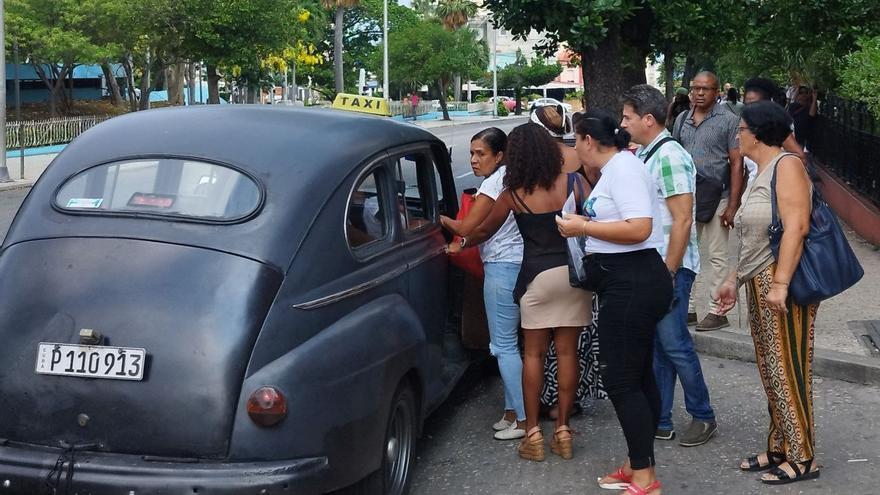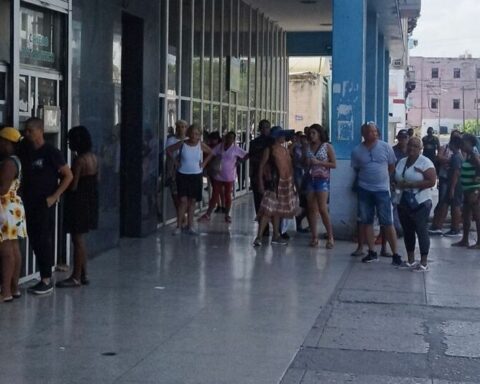The young man stretches out his hand with a 200-peso bill that the driver grabs, without giving any change. It is the price of a collective taxi in the section from Parque de la Fraternidad to Santiago de las Vegas, in Havana, a distance of just over 22 kilometers. Starting next Friday, private drivers will be obliged to charge half for that journey, according to the new maximum prices imposed by the General Directorate of Provincial Transport.
The New Rates arise “from the need to update the prices of the passenger transportation service offered by the Non-State Management Forms”, begins by saying the note published this June 5 by the state entity. The initial proposal was “arranged with the majority of the holders who have a transport operation license, in each of their territories,” he adds.
According to the Directorate, the Cuban capital has “46 passenger transportation routes operated by private carriers, with an average distance of approximately 11.6 kilometers.” The prices for a short section are set at 45 pesos, the medium ones at 70 and 100, while the longer routes, such as the one from Guanabo beach to Old Havana, are bumped into in 170.
The new figures represent at least half of what private carriers are currently charging, rates that have risen steadily since the fuel crisis sent transport availability plummeting. Drivers allege difficulties in buying gasoline, high prices for spare parts and the general increase in the cost of living.
In 2021, the year in which the Ordinance Task began, prices in Cuba suffered a 77.3% rise in the consumer price index (CPI) mainly dragged for transportation, which grew by 188%, a data made public by the National Office of Information and Statistics (Onei). Since then they have continued to rise with no end to the rise in sight.
“Neither the State nor the passenger give the taxi driver anything,” laments David Pousada in a harsh comment on the account of the Provincial Transportation Directorate. “While the Botero If you have to buy medicine for 1,000 pesos, a bottle of oil for 1,500, chicken for 3,000, fuel for 400 per liter and a soft drink in the cafeteria for 150, the price will not drop”.
“Other times, when they have announced capped prices, what has happened is that many drivers stay at home and do not go out to work for that amount of money”
At the collection points, such as the Parque de la Fraternidad, the news had also spread this Monday morning among the drivers. “This is the country of 15 days, nothing has a fixative. Now they cap prices, they send inspectors out into the streets to drop us on every corner, they fine us, they take some boatmen to jail to intimidate, and at two weeks everything goes back to how it was yesterday,” he told 14ymedio Roly, who drives a nine-seater vehicle that makes the route to Playa.
Clients, for their part, are torn between hope and doubt. “It relieves me, I don’t doubt it, because if this happens I’m going to spend half of what I’m spending now to move from La Víbora to the Capitol,” acknowledges a young woman who works in a private restaurant near Central Park. “But other times, when they have announced prices bumped into, what has happened is that many drivers stay at home and they don’t go out to work for that amount of money.”
Others, like Yuniel, 23, questioned that “in the section that costs 45, what driver is going to give you back five pesos if you paid with a 50 bill?” According to this young man, “it’s not just about prices, but about the low availability of bills, especially small bills, because ATMs go days without cash and the lines to withdraw money are getting longer.”
The authorities warn that “the actions of confrontation and control on the road will be reinforced (…), applying to drivers who are detected violating the established prices, Decree 30 of 2021. In the case of those who carry out the activity illegally, it will act more rigorously, applying Decree 45 of 2021”.
They have also enabled the telephone number 78813110 and the email address [email protected] so that the clients themselves report drivers who violate the new rates to “act on the offender” and request that the report include “day, hour , vehicle registration number and the price charged”.
In addition to Havana, the prices bumped into have reached the center of the island, where this Monday the local press announced that “the price of 15 pesos per passenger is set for combustion tricycles, within the city of Cienfuegos, in the perimeter from any point of the city to the ring road” and in the case of two-seater motorcycles, “the price is 30 within the mentioned perimeter”.
Similar news is expected to be published in the official media in the rest of the country’s cities in the coming days.
________________________
Collaborate with our work:
The team of 14ymedio He is committed to doing serious journalism that reflects the reality of deep Cuba. Thank you for accompanying us on this long road. We invite you to continue supporting us, but this time becoming a member of our newspaper. Together we can continue transforming journalism in Cuba.







